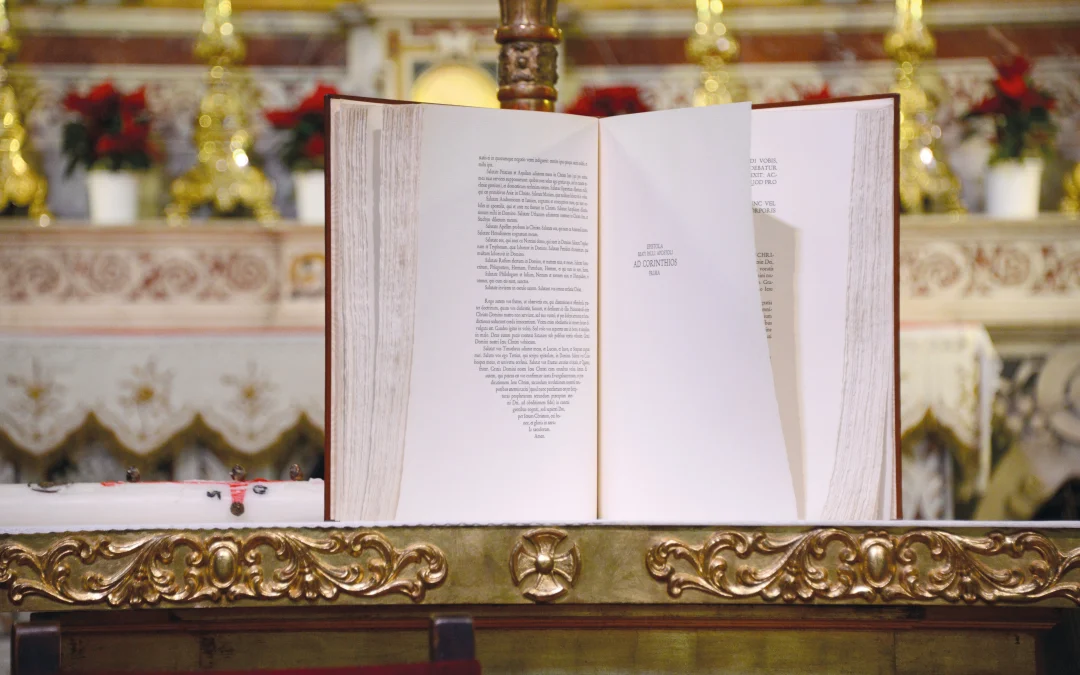Remember Eternity! So often we easily forget eternal things amidst the turbulence of day-to-day life. We forget the most important things, things that will last forever, because the flux of time drowns out the eternal. Time is short and eternity is long. How much better we would live out our Catholic Faith if we could stay focused on what really matters and what will last forever! The Catechism insightfully notes that, rightly understood, being focused on Heaven and eternal things does not turn us away from our concrete life and responsibilities here and now but rather helps us transfigure earthly things with the light and love of God (CCC 1049-50). St. Elizabeth of the Trinity (1880-1906) who was canonized in 2016 is a Saint given to us in our times, in part, to help us reclaim this eternal perspective in our lives. We will consider a letter of hers to a young lay woman in the world, Germaine de Gemeaux. St. Elizabeth will help us to live in this radical perspective of faith and hope and so live out more completely the life of charity.
St. Elizabeth’s Heavenly Days
St. Elizabeth writes to her friend Germaine, “Oh, if you knew what heavenly days your friend is spending in Carmel! I am growing weaker day by day, and I feel the Master will not delay much longer in coming to seek me. I am tasting, experiencing unknown joys. The joy of pain, oh! little Germaine, how pleasant and sweet it is!… Before I die, I dream of being transformed into Jesus Crucified, and that gives me so much strength in suffering…. Little sister, we should have no other ideal but to be conformed to that Divine Model; then what eagerness we would have in sacrifice, in contempt of ourselves, if the eyes of our heart were always focused on Him.”
These “heavenly days” that Elizabeth speaks of come not in the midst of bliss but suffering. It is a curious progression of thought here: “heavenly days,” “I am growing weaker day by day,” “I am tasting, experiencing unknown joys. The joy of pain…how pleasant and sweet it is!” What is it that empowers Elizabeth to find heaven (!) in the midst of this pain? Her answer is, “I dream of being transformed into Jesus Crucified, and that gives me so much strength in suffering.” She is eager to be transformed into Jesus, the One who suffered, died on the Cross, and rose in glory. If our all-consuming passion was to be transformed into Christ, like Elizabeth, “then what eagerness we would have in sacrifice, in contempt of ourselves, if the eyes of our heart were always focused on Him.”
Power comes forth from Christ to transform our life and even our sufferings but how practically could it turn out that this power actually reaches every nook and cranny of our life? Elizabeth’s answer here is, “If the eyes of our heart were always focused on Him.” Here we see how Elizabeth’s life of interior recollection affects not just those set times of mental prayer but her whole life. She wants to be like Jesus to be more intimately united with Him and since this requires suffering, she is eager to embrace it. It is not suffering in itself, but suffering as part of God’s plan for an eternal glory in Christ that brings her joy:
“If you knew what ineffable happiness my soul tastes when I think that the Father predestined me to be conformed to His crucified Son….Saint Paul informs us of that divine election that seems to be my share!”
Her eyes are fixed on Christ, but the whole Christ in his eternal mystery. This includes Jesus on the Cross whose “prayer is eternally living and present before the Father” as she says, but also Jesus seated at the right hand of the Father in His eternal glory, where “our life is hidden with Christ in God” (Col 3:3). Eternity or the “Standing Now” (Nunc Stans, for Aquinas, ST I q. 10, a. 2, ad 1), gathers up into the eternal present all of time. As Elizabeth says elsewhere, the present moment is “eternity begun and still in progress” (Last Retreat 1). Eternity, vice-versa, gives us access to both the Cross of Christ from the past and the future glory held out to us in the glorified Christ. It is in this eternity that Elizabeth strives to dwell.
Although Elizabeth does not quote from Col 3:1-4 in this letter, its key ideas are pervasive here and throughout her thought—especially the call to set our hearts on things above, not on earthly things, for we died (united with Jesus on the Cross) and our life is hidden with Christ in God (grasped now through faith and hope). Col 3:1-4 is worth meditating on to see how Elizabeth’s perspective is so very rooted in the Bible’s perspective. If one finds this mystic of Dijon too otherworldly, it is worth noting that the inspired Word of God is not less so! The words of her dear Saint Paul remain close to her heart and turns her attention to eternal things while being engaged in her duties of daily life on earth.
The Emphasis On Eternity
We find in Elizabeth’s spirituality and interior prayer a very strong emphasis on eternity. She strives to live in the realm of eternity. She keeps in mind an eternal perspective as she goes through her days and this transfigures these days into “heavenly days,” even as they are filled with the most ordinary tasks or with intense suffering. Elizabeth explains, “Little sister of my soul, in the light of eternity God makes me understand many things, and I come to tell you as if it were coming from Him not to be afraid of sacrifice, of struggle, but rather to rejoice in it.” Days of suffering can be considered as “heavenly days” only in light of eternity and the fruit that such struggles can bear into eternity.
Elizabeth’s ardent desire to live immersed in eternity finds expression too in the first line of her Oblation to the Trinity. “O my God, Trinity Whom I adore; help me to forget myself entirely that I may be established in you as still and as peaceful as if my soul were already in eternity.” Elizabeth wants to live anchored in the same realities she will possess in heaven, but here on earth, by faith and hope. Faith and hope do actually attain to the reality even if through the veil. This is why there can be such a quietude in contemplation: because we are beginning to rest in our final end, God Himself. As careful a thinker as Aquinas insists that faith terminates not in propositions or articles of faith but in the reality itself (res), the reality of God (ST II-II q.1, a.2, ad 2). So Elizabeth is on solid theological ground when she reaches out in faith and hope to live the life of heaven even on earth, in communion with the Triune God dwelling in her soul.
This focus on “heaven in faith,” through her union with the Triune God dwelling in the depths of her soul as in a temple through grace, as an effect, changes her perspective on everything. Through faith she has learned to view things from the vantage point of eternity so the passing turbulence of earth no longer needs to steal her peace in God. There is still emotional tumult at times but while there may be turbulent waves on the surface level, the depths of her soul remain anchored in the peace of God, “as still and as peaceful as if my soul were already in eternity.”
In prayer especially, we can step up to the threshold of eternity and even into eternity. We might sometimes pray as if we were already in eternity, when all our earthly concerns will be left far behind and it will be all about God. There is truth to this disposition. For, in some ways, we already possess heaven in faith and even now God really does tower above all else in importance. Moreover, in all objectivity, our felt anxieties in life are more excessive than they really need to be, as reflection on our past experiences often show. These vain and empty anxieties lose their grip on us when dwelling in the stillness of eternity, “as still and peaceful as if my soul were already in eternity.”
At other times, we might dwell on the threshold of eternity stretching out towards it. When we begin a prayer, whether an Our Father or the Jesus Prayer, we might sometimes think, With this prayer I may break through into eternity: “Lord Jesus Christ, have mercy.” Stretching out toward the Lord, I may break through into his eternal embrace. It is all very calm and peaceful, being on the brink of eternity. And if we are sleepy in prayer, it is a good way to rouse ourselves a little! Just a little while and we will see the Lord face-to-face, heart-to-heart. It is just a blink away. With this next prayer, with this next act of love, I may break through into eternity.
Our times of prayer like this, can help us to look more towards eternity. Tomorrow…Eternity. This life will pass and the next life come quickly. This can help us bring this eternal perspective, which is so decisive, into our own outlook. We might reflect on Col 3:1-4 and ask ourselves the following questions. How am I doing fixing my mind and heart on things above? If the Lord, through the word of God, is directing me to focus on the things of heaven, what keeps me from doing it? Heb 3-4 challenges us to enter into our heavenly sabbath rest even now, why would I refuse to accept God’s gift of peace in this way? If I were to do better living out Col 3:1-4, how would it affect how I deal with this or that situation, as I am engaged in my duties of life? If Elizabeth and her lay friend could do it, why not I? St. Elizabeth, will you pray for me in this struggle for what lasts forever?
Finally, there is one other way that Elizabeth can call her days of suffering “heavenly days,” these days in which she is “growing weaker day by day.” She expands upon this theme as she encourages Germaine not to give in to discouragement in her weakness but to trust in God, utterly dependent upon Him. “Do not be discouraged, do not become sad. I would gladly say to you: love your misery, for that is where God exercises His mercy…The more you feel your weakness, the more your confidence must grow, for you must depend on Him alone.” Perhaps surprisingly, utter dependence on God in this life already prefigures the life of heaven. For in heaven, God’s life will be our very life to the full, in glorious splendor, in sharing in the Divine Nature (cf. 2 Pt 1:4). As the supernatural life increases in us so too does our dependence on God.
We need not fear our weakness. We cannot be too needy or desperate for God, for He can fill our emptiness to overflowing. “Blessed are the poor in spirit, for theirs is the Kingdom of Heaven” (Mt 5:3). Elizabeth already has a taste of heaven precisely in her poverty of spirit and utter dependence on God; so in the midst of suffering, she already possesses something of the joy of the Blessed. With the light of eternity shining in our souls too, we also can come to taste the blessedness of dependence, dependence on the God who one day will be all in all.
*Quotations in essay from the Institute of Carmelite Studies Saint Elizabeth of the Trinity: The Complete Works













